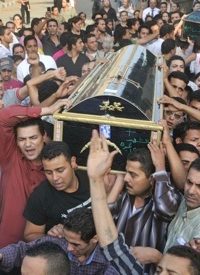
The anti-Christian policy of the Egypt military rulers became even more readily apparent as they blamed Christian victims and “enemies of the revolution” for a series of violent clashes which left over two dozen people dead. In another tragic example of a military junta blaming its victims for its oppressive actions, Major General Adel Emara denied widespread reports of the military’s actions, which murdered dozens of Christians, According to one Associated Press report, Emara “tried to clear the military of any blame in the killings. He denied troops opened fire at protesters, claiming their weapons did not even have live ammunition. He said it was not in ‘the dictionary of the armed forces to run over bodies … even when battling our enemy.’ “
The Coptic Church — which Emara seems to consider the “enemy” of the ruling council of Egypt of which he is a member — experienced a very different side of Egypt’s military than that which is being creatively constructed by the regime. As Alex Newman wrote previously for The New American:
Anti-Coptic violence in Egypt, of course, is hardly a new phenomenon. Islamic extremists have been bombing Christian churches there for years. But in the post-Mubarak era the attacks have intensified — and this weekend’s state-sponsored violence might be the start of a whole new chapter. …
But now, members of the Coptic community are becoming increasingly concerned about their fate as radical Muslim groups — long repressed by Mubarak — wield growing power and influence. Eye-witness reports of the weekend violence offered an ominous warning about what may be coming.
In point of fact, Coptic Christians — who make up approximately 10 percent of the population of Egypt — have been under siege by Muslims and a military government sympathetic to anti-Christian violence. In fact, the latest round of horrific violence began when military police attacked peaceful protesters; in the words of the AP report:
Witnesses and Christian protesters have denied the demonstrators started the fighting. Videos show that the violence appeared to begin when military police with shields charged protesters who were peacefully holding speeches outside the state TV building. Another shows a soldier firing at protesters at close range from the back of a speeding armored vehicle weaving through the crowd.
Such violence against Christians has long been a regular feature of life in Egypt — as, indeed, it is common throughout the Islamic world. Nevertheless, the plight of Coptic Christians has, if anything, become even worse since the overthrow of the Mubarak government during the “Arab Spring.”
Contrary to Emara’s attempts to deflect responsibility for the violence from Egypt’s military government, the forensic investigation conducted in the aftermath of the military’s slaughter of protesters substantiated the charge by Christians that the victims had been run over by tanks or simply gunned down; according to the AP story, “a third of victims were killed by being run over by the armored vehicles, while two-thirds were shot with live ammunition.”
Fear of Egypt’s Islamic government is widespread within the country’s Christian community. Mindful of the plight of those Egyptian Christians — who though separated from Rome and who have their own pope (Shenouda III), are regarded as spiritual brothers by Catholics — Pope Benedict XVI condemned the violence, and once again called for a democratic transition for Egypt. A story for the Catholic News Service (“Pope, at audience, condemned attack on Christians in Egypt”) noted that “The pope asked Catholics to pray that Egypt would ‘enjoy true peace based on justice and respect for the freedom and dignity of every citizen.’ ‘In addition, I support the efforts of Egyptian civil and religious authorities in favor of a society in which the human rights of all — especially minorities — are respected to the benefit of national unity,’ the pope said.”
At this juncture, such exhortations — and an increased awareness of the character of Islamic governance — are the best hope for Egypt’s Christian minority. As noted in May for The New American, “As bad as conditions were for Christians under the Mubarak regime, their plight has grown steadily worse since the revolution which drove the old government from power. But church burnings and bombings seem to draw little press coverage in the West.” Whether or not the latest round of anti-Christian violence leads to any political pressure on Egypt’s ruling council, it seems unlikely that “democracy” will solve the plight of the persecuted Christian minority. What the victims of state and religiously-sponsored violence need is equality under law — a status which seems unlikely under any “democratically” selected government in Egypt. With the radical Muslim Brotherhood likely to gain political power through such elections, the will of the majority of Egyptians is likely sympathetic with those who are shooting Christians and running them down with tanks.
“Democracy” is small comfort when the majority is bent on depriving a small minority of any legal standing.
Photo: Coptic Christian mourners carry the coffins of victims of clashes between protesters and security forces in Cairo, Egypt, Monday, Oct. 10, 2011: AP Images



